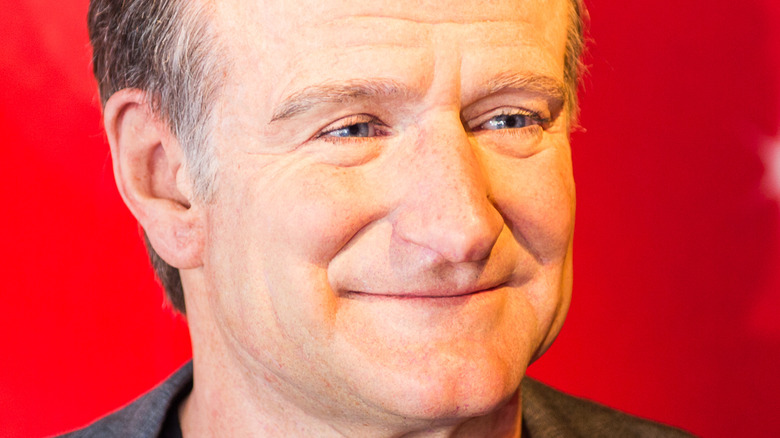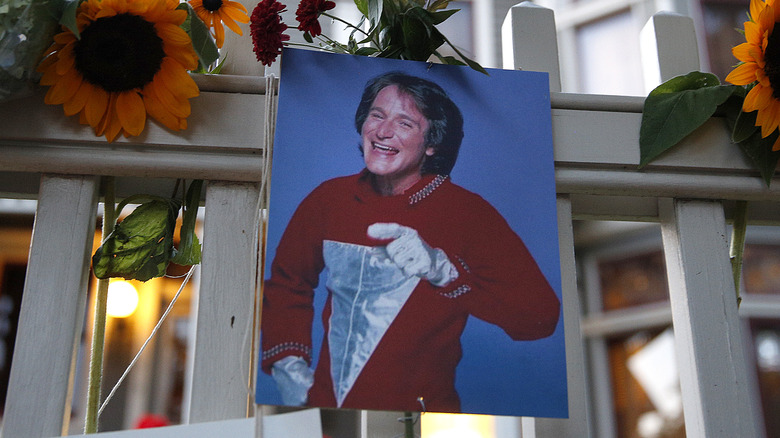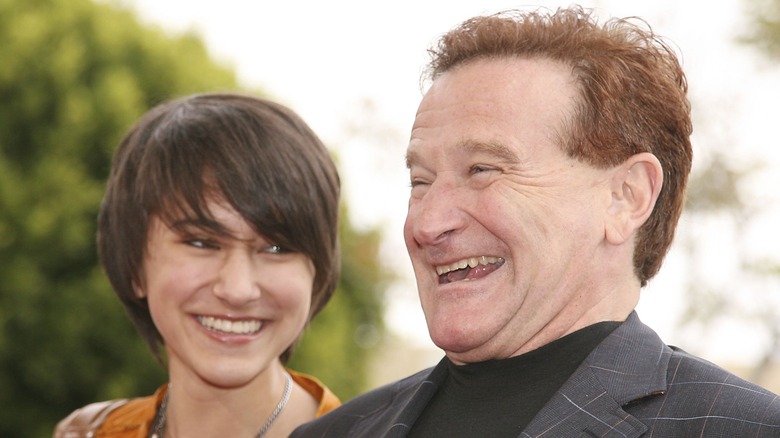Disturbing Details Discovered In Robin Williams' Autopsy Report
Robin Williams was one of the most beloved comedians of all time. The Oscar-winning actor was born in Chicago on July 21, 1951, and by the 1970s, his over-the-top stand-up comedy routine and an appearance on the popular sitcom "Happy Days" led to the defining role of Mork from Ork on the hit television show "Mork and Mindy" (via IMDb). From there, Williams' star was on the rise. By 1980, he made his first movie, "Popeye," and went on to score three best actor nods, before finally winning a best supporting actor Oscar for 1997's "Good Will Hunting." He also made a string of beloved hit family-oriented films, including "Mrs. Doubtfire," "Jumanji," and "Aladdin."
He entertained generations of audiences through a body of award-winning work that spanned more than four decades, and his big personality was dwarfed only by the size of his generous heart. Williams, along with good friends Whoopi Goldberg and Billy Crystal, hosted the first U.S. Comic Relief in 1986 to help end world poverty, raising more than $2.5 million for charity that first year. The trio continued hosting the annual special until 2006 and loved privately traveling in subsequent years to give away the money to groups and shelters, according to Biography. Given Williams' enormous influence, it was heartbreaking when he was found dead by suicide on August 11, 2014, in his home in Tiburon, California. He was 63 years old. Williams was battling Parkinson's disease when he died, but his autopsy showed that's not all.
If you or anyone you know is having suicidal thoughts, please call the National Suicide Prevention Lifeline at 1-800-273-TALK (8255).
A look at Robin Williams' start in Hollywood
In 1978, with his stand up career on a breakneck ascent, Robin Williams was cast to play a goofy alien from the planet Ork, known as Mork, on ABC's primetime hit, "Happy Days" (via Biography). Hoping to capitalize on the massive cultural success of the movie "Star Wars," "Happy Days" producer Garry Marshall wrote the quirky alien into an episode of the hit series. Mork (and Williams) proved so popular that ABC spun the character off onto his own show that very fall. Running from September 1978 through May of '81, "Mork and Mindy" turned Williams into a household name.
While his career was taking off, the pressure was proving too great for the comedian. According to The Recovery Village, Williams began using cocaine and alcohol to help manage his overnight success. Rumor and story abound when it comes to Williams' drug abuse. It's widely known that the actor was partying with fellow comedian John Belushi the night the "Saturday Night Live" actor died from an overdose of cocaine and heroin (via Rare).
If you or anyone you know is struggling with addiction issues, help is available. Visit the Substance Abuse and Mental Health Services Administration website or contact SAMHSA's National Helpline at 1-800-662-HELP (4357).
Did he have depression, or was it something more?
The death of his friend, coupled with the birth of his son, convinced Williams to start dealing with his addictions. Over the next several decades, Williams reportedly managed his addictions with varying degrees of success. In 2003, while on set in Alaska filming the movie "The Big White," addiction reared its ugly head once again in Williams' life. The comedian talked about the experience with The Guardian in 2010, saying, "I was in a small town where it's not the edge of the world, but you can see it from there, and then I thought: drinking. I just thought, hey, maybe drinking will help. Because I felt alone and afraid." According to The Hollywood Reporter, after an ultimatum from his son, Williams checked himself into an addiction treatment center in August of 2006.
On August 11, 2014, Rebecca Spencer, Williams' long-time personal assistant, found the actor dead in his bedroom (via Vanity Fair). He was found with a belt around his neck and superficial cuts on one of his wrists, according to SFGate. His cause of death was "asphyxia due to hanging."
For Williams, the effects from a recent diagnosis of Parkinson's, a disease that attacks the central nervous system causing tremors, stiffness, and slurred speech (via Mayo Clinic), had reportedly started to settle in. According to Vanity Fair, the disease was affecting his memory the most, causing him to have difficulty remembering his lines. However, while the consensus for Williams' suicide seems to point toward depression, Susan Williams, Robin Williams' widow, insists it wasn't depression, but a misdiagnosis (via The Guardian).
Robin Williams' autopsy revealed he had Lewy body dementia
When the coroner division of the Marin County Sheriff's Office released Robin Williams' autopsy report two months after the actor died, it revealed conditions that his family and close friends already knew about and at least one that they didn't, per ABC News. The comedian had a hard-to-diagnose condition called Lewy body dementia, and it could have played a part in his decision to end his life.
Known as LBD, Lewy body dementia is a progressive dementia leading to "a decline in thinking, reasoning and independent function of abnormal microscopic deposits that damage brain cells," according to Alzheimer's Association. It's often hard to determine whether a diagnosis is LBD or Parkinson's disease, which Williams also had. Since he had depression, it wasn't unusual that the toxicology report found antidepressants in his system (via The Hollywood Reporter), along with caffeine and the Parkinson's drug levodopa. And, although Williams had a history of alcohol and drug abuse, the autopsy found none in his system.
In addition to LBD, Williams' autopsy report also found changes in his brain that are characteristic of both Alzheimer's and Parkinson's disease. According to The Hollywood Reporter, these changes had an impact on his behavior in the days leading up to his death, but his wife, Susan, had revealed that the comedian seemed fine the night before his death. His suicide by hanging came as a shock to not just his family, but to his friends and millions of fans around the world who grieved the loss of the beloved entertainer.
This is how Lewy Body Dementia affected Robin Williams
According to an article in Neurology, written by Susan, the last few months of Williams' life were fraught with fear, anxiety, and delusions. Tellingly, she titled her piece "The terrorist inside my husband's brain." Williams' early symptoms included insomnia, heartburn, and stress. They also readily increased issues with his mental state. Eventually, Williams began to lose his memory and was unable to remember his lines. Although he sought medical help numerous times, nothing brought him relief. In the end, the array of disturbing psychological symptoms that he was unable to control left him distraught (per Scientific American).
Simply put, Williams was very much aware that his mind was failing him, which only added to the devastation. He later told Susan, "I just want to reboot my brain" (via Neurology). In 2020, "Robin's Wish," a documentary about Williams and his struggles with LBD (the trailer can be seen on YouTube), was released (per The Guardian). The film provides an extensive insight into how this horrific disease ravaged the beloved comedian's body and, ultimately, his soul.
In the documentary's trailer, Dr. Bruce Miller from the University of California, San Francisco stated that Williams' case was so severe that "it really amazed me that Robin could walk or move at all." The National Institute of Neurological Disorders writes that the documentary was Susan's idea. Her goal was to inform the public about LBD, a disease that affects over 1 million people, as well as honor Williams' selfless spirit. Shortly before his death, Williams had expressed to Susan, "I want to help people be less afraid" (via KARE).




